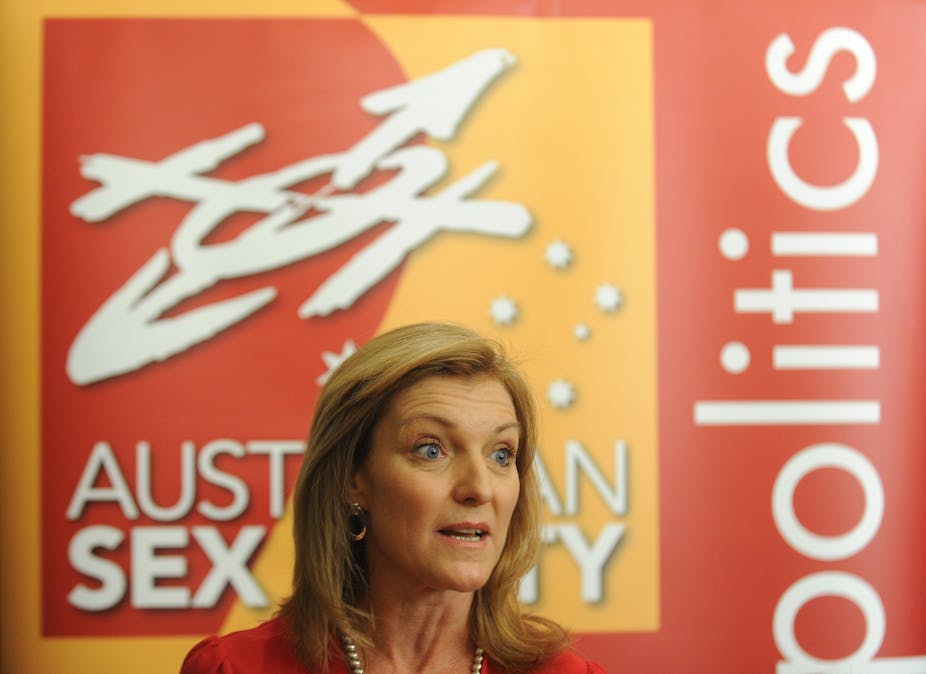“Vote for more sex!” Walking through the party pamphleteers to vote in Melbourne last week felt more like passing through a light-hearted student union ballot than a tightly contested state by-election. But while the Australian Sex Party (ASP) may sound like an undergraduate joke, there are compelling reasons to take the Sex Party seriously.
Indeed, a number of my colleagues have taken it so seriously that they have voted for the Sex Party. Looking at the recent campaign material, it’s not hard to see why. The ASP represents itself as a “civil liberties” party and it promotes ideas that have broad appeal - especially in left-leaning, inner-city seats like Melbourne - but are unlikely to appear in any major party’s suite of policies.
Some of the more publicised aspects of the ASP platform include, reform on drug law. Fair enough. An inquiry into the Myki debacle. Yes please. More public transport services at weekends. Great! A clearer separation between church and state. Amen.
The carefully selected policies that appear in Sex Party pamphlets, however, fail to mention what is at the centre of the party’s very being; a push for the full decriminalisation of prostitution. This would basically end the criminalisation of all forms of prostitution and make them free from any special government intervention.
From an outsider’s perspective, it may appear that decriminalisation is unnecessary in Victoria, which has one of the oldest systems of legalised prostitution in the world. But legalisation means regulation and the sex industry would rather have free rein to boost its profits. Scratch the surface and it is clear that the Sex Party is really just window dressing for a sex industry lobby group.
Essentially, the ASP is the political wing of the EROS Association, Australia’s national “adult retail and entertainment” association. And who is the president of the ASP? Fiona Patten. Patten is also CEO of the EROS Association. You might recognise her as the Sex Party candidate for the Melbourne by-election.
Patten helped make the real aims of the party quite clear in the lead-up to the election when she claimed that the ASP didn’t attempt a preference deal with the Greens because of concerns about an “anti-sex feminist element” in the party.
The “anti-sex” slur was most likely just a veiled reference to Kathleen Maltzahn, who served as a Greens local councillor in Yarra and stood as a Greens candidate in the 2010 Victorian state election.
Maltzahn is also a prominent anti-trafficking campaigner and founder of Project Respect. According to its website, Project Respect is a “non-profit, feminist, community-based organisation, that aims to empower and support women in the sex industry, including women trafficked to Australia”. Part of its vision is given as “a world where there is no longer demand for prostitution.” Now, why wouldn’t a sex industry lobby group be happy with that?
Many of my colleagues are quite shocked to hear about the intimate relationship between the Sex Party and the sex industry, but some persist with wilful ignorance.
In an article on the joys of the Sex Party on The Conversation, for example, Christine Steinmetz didn’t even feel the need to mention the EROS connection. That the commercial interests of the sex industry might occasionally clash with the pursuit of civil liberties, or other important things - like say, gender equality - is apparently unthinkable.
The fact that this is unthinkable, is a crucial point. The Australian discussion around the sex industry exists largely in a bubble where liberal notions of choice reign supreme. This creates an unusual climate where it is thought that, to be progressive, you must be sympathetic to an industry that principally relies on the buying and selling of women.
Elsewhere in the world, however, socialists, social democrats and other social progressives are moving towards understanding prostitution as a form of violence and as a barrier to women’s equality. In terms of legislation, this is epitomised by the Nordic Model, which criminalises the buying of sexual services, but decriminalises selling.
Despite mounting evidence that the Nordic Model is effective in curtailing prostitution and sex trafficking, it continues to be derided and dismissed in Australia. Earlier this year, for instance, the Kirby Institute at UNSW released a report on the sex industry in New South Wales, which claimed that the difference between the Nordic Model and full criminalisation (often favoured by conservative political regimes) may be “largely illusory”. It also trotted out the tired claim that criminalising the buying of sexual services automatically positions “sex workers as victims”.
Assertions such as these continue to fuel an odd situation in Australia. If, when talking about prostitution, you raise issues of exploitation or structural inequality – traditionally hallmarks of Marxist analyses – you get accused of being a right-wing moralist. It can feel as though people think liberalism is as far left as you can get.
But perhaps this constant bias shouldn’t be surprising in a country where the sex industry not only has its own political party but has also managed to con a bunch of academics, among others, into voting for it.

